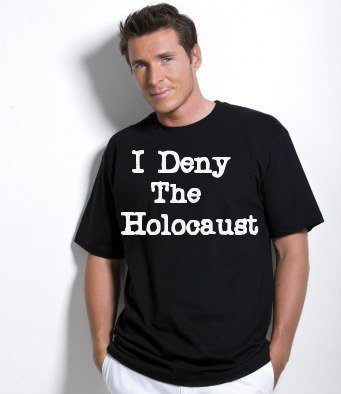Reaction Time: Keep Holocaust Denial Out Of The Curriculum

This week, eighth grade students in Rialto were assigned an argumentative essay. In this assignment, they were asked to research, cite textual evidence and provide an argument – all things that are pretty standard for a junior high writing assignment.
The subject matter, however, was less than standard. The prompt given to the students was to “Write an argumentative essay, based upon cited textual evidence, in which you explain whether or not you believe this was an actual event in history or merely a political scheme created to influence public emotion and gain wealth…”
Incredibly, the “this” that is referred to in the prompt is the Holocaust.
That’s right. Eighth graders in Rialto this week were assigned an essay asking them to argue whether or not the Holocaust happened or whether it was simply a “political scheme,” created by Jews I assume, to “influence public emotion and gain wealth.”
First off, I have no idea who thought that this was a good idea. The assignment does ask students to think critically about a topic and provide an argument – but there are so many other ways this could’ve been done. Generally, when students are creating a thesis for a paper they are, in some ways, crafting an argument; if critical thinking and learning how to argue were the goals, the school could’ve had students debate the merits of the latest Oscar-winning film, among hundreds of other things. If, for whatever reason, the essay had to be about students arguing whether or not an historical event actually occurred, choosing almost anything besides a genocide probably would have been wise. After all, there are so many historical events that could be debated without insulting entire cultural and religious identities and delegitimizing the suffering of millions.
Furthermore, how did whoever assigned this essay not understand the deeper implications of the assignment? By asking students to take sides as to whether or not the Holocaust happened, the school was (perhaps inadvertently; I’m praying it was inadvertently) creating future contributors to a very real modern problem: Holocaust denial.
Genocide denial is nothing new. It seems in fact, that throughout history, as soon as the survivors of a particular genocide begin to die of old age, genocide deniers begin to surface. Sometimes, it happens even sooner. There are, of course, deniers of the Armenian genocide. There are deniers of the Cambodian genocide, and there are entire countries with an official policy of Holocaust denial. The issue of genocide denial goes far beyond the issue of anti-Semitism; rather, it’s a matter of global education and the global responsibility of ensuring that these human rights abuses do not ever happen again.
I am a scholar of history, someone who chooses to spend time and money discussing things that happened in the past at an institution of higher learning. The reason that I am a scholar of history is not just because I couldn’t hack it as a pre-med or engineering student. I truly believe that the only way to shape our future is by studying and understanding the events of the past. When this doctrine is applied to genocide, perhaps it was philosopher George Santayana who said it best: “Those who cannot remember the past are condemned to repeat it.” It is a school’s job to ensure that students are learning facts about events that occurred throughout the world in the past. That’s what history is. And yes, history includes analysis and arguments and critical thinking and all of that, but all of these aspects constitute a response to facts. By allowing students to craft entire arguments disputing the historical existence of the Holocaust, this school was not only contributing to Holocaust denial, but cheating their students out of the facts that they were supposed to be taught.
As far as I’m concerned, you can’t call someone who teaches Holocaust denial a teacher or a professor; they are more like misguided preachers who choose to take advantage of a room full of children who are expected to take everything they say as fact. And, no, this school wasn’t per se teaching Holocaust denial – they were asking students to weigh the evidence and deny (or accept) the Holocaust themselves. But, again, at the very least, this assignment was unnecessary, if not harmful and insulting.
In response to widespread criticism (including from the Anti-Defamation League, which called the assignment “misguided,” and the Simon Wiesenthal Center, which called it “grotesque”), representatives from the school have sort of apologized. Sort of. Apparently, the assignment was just a “mistake” – district spokeswoman Syeda Jafri told the LA Times that the essay was “…a bad mark on our record and we will fix it and move forward.”
I’m all for fixing things and moving forward, but to me, this incident requires a little more than that. How about a real apology, at the very least? There are so many ways that the school could’ve handled this better. The assignment never should’ve been handed out to begin with, but the school could’ve used this as an opportunity to teach students how to respond when you do something wrong. Instead, the school is sidestepping any responsibility, which is not exactly a good message for children.
In the future, perhaps schools should keep the “scholarly” debate topics away from genocide – that is, at least until they have their facts straight.
Get more common sense reactions to every-day craziness with "Reaction Time".



